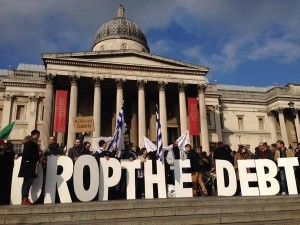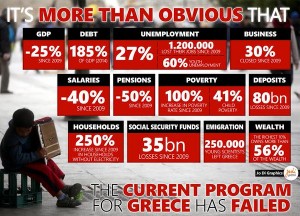Please sign it here
Greece is on the frontline of Europe’s debt crisis. The Greek people have suffered six years of draconian austerity measures but the country’s debt has grown ever bigger – it has shown that austerity measures do not work for the people, but only for the banks. €10 billion in debt repayments are due between now and the end of August. A Europe-wide petition on the Debt has been launched by 42 organisations in 14 countries. In the UK the Greece Solidarity Campaign is working with the Jubilee Debt Campaign to get hundreds of thousands to sign the petition.
The petition
‘We, the citizens of countries across Europe, call for:
- A European conference to agree debt cancellation for Greece and other countries that need it, informed by debt audits and funded by recovering money from the banks and financial speculators who were the real beneficiaries of bailouts.
- An end to the enforcing of austerity policies that are causing injustice and poverty in Europe and across the world.
- The creation of UN rules to deal with government debt crises promptly, fairly and with respect for human rights, and to signal to the banks and financiers that we won’t keep bailing them out for reckless lending.
The Debt Truth Commission’s Preliminary Report 17th June 2015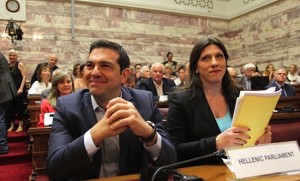
‘The debt imposed on Greece and its residents by creditors directly infringes the human rights of Greeks and is “illegal, illegitimate and odious,” according to the preliminary report issued on Wednesday by the Audit Committee on Public Debt.’Greek Reporter
The Executive Summary of the report from the Debt Truth Commission starts with the words:
‘In June 2015 Greece stands at a crossroad of choosing between furthering the failed macroeconomic adjustment programmes imposed by the creditors or making a real change to break the chains of debt. Five years since the economic adjustment programmes began, the country remains deeply cemented in an economic, social, democratic and ecological crisis. The black box of debt has remained closed, and until now no authority, Greek or international, has sought to bring to light the truth about how and why Greece was subjected to the Troika regime. The debt, in whose name nothing has been spared, remains the rule through which neoliberal adjustment is imposed, and the deepest and longest recession experienced in Europe during peacetime.
There is an immediate need and social responsibility to address a range of legal, social and economic issues that demand proper consideration. In response, the Hellenic Parliament established the Truth Committee on Public Debt in April 2015, mandating the investigation into the creation and growth of public debt, the way and reasons for which debt was contracted, and the impact that the conditionalities attached to the loans have had on the economy and the population. The Truth Committee has a mandate to raise awareness of issues pertaining to the Greek debt, both domestically and internationally, and to formulate arguments and options concerning the cancellation of the debt.
The research of the Committee presented in this preliminary report sheds light on the fact that the entire adjustment programme, to which Greece has been subjugated, was and remains a politically orientated programme. The technical exercise surrounding macroeconomic variables and debt projections, figures directly relating to people’s lives and livelihoods, has enabled discussions around the debt to remain at a technical level mainly revolving around the argument that the policies imposed on Greece will improve its capacity to pay the debt back. The facts presented in this report challenge this argument.
All the evidence we present in this report shows that Greece not only does not have the ability to pay this debt, but also should not pay this debt first and foremost because the debt emerging from the Troika’s arrangements is a direct infringement on the fundamental human rights of the residents of Greece. Hence, we came to the conclusion that Greece should not pay this debt because it is illegal, illegitimate, and odious.
It has also come to the understanding of the Committee that the unsustainability of the Greek public debt was evident from the outset to the international creditors, the Greek authorities, and the corporate media. Yet, the Greek authorities, together with some other governments in the EU, conspired against the restructuring of public debt in 2010 in order to protect financial institutions. The corporate media hid the truth from the public by depicting a situation in which the bailout was argued to benefit Greece, whilst spinning a narrative intended to portray the population as deservers of their own wrongdoings.
Bailout funds provided in both programmes of 2010 and 2012 have been externally managed through complicated schemes, preventing any fiscal autonomy. The use of the bailout money is strictly dictated by the creditors, and so, it is revealing that less than 10% of these funds have been destined to the government’s current expenditure. Read the full report here
Video of Speech by the Speaker of the Greek Parliament to an Assembly of speakers of all EU national Parliaments – on the devastating impact of the austerity imposed on Greece and on the Truth Commission to Audit the Greek Debt. April 20-21 2015
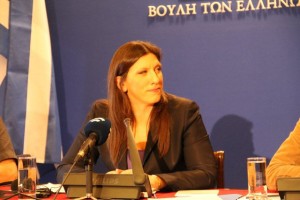 Zoe Konstantopoulou – the speaker of the Greek parliament – explains the impact of austerity policies on Greece, explains the setting up the Greek Truth Commission to audit the Debt and the violation of democracy and human rights. She is in the Italian Parliament which is hosting an assembly of the speakers of all EU national parliaments.
Zoe Konstantopoulou – the speaker of the Greek parliament – explains the impact of austerity policies on Greece, explains the setting up the Greek Truth Commission to audit the Debt and the violation of democracy and human rights. She is in the Italian Parliament which is hosting an assembly of the speakers of all EU national parliaments.
Watch the video here
Appeal to support the resisting Greek people and their Truth Commission on the Public Debt. May 2015
To the people of Europe and the whole world!
To all the men and women who reject the politics of austerity and who are not willing to pay a public debt which is strangling us, which was agreed to behind our backs and against our interests.
We signatories to this appeal stand by the Greek people who, through their vote in the election on January 25 2015, became the first population in Europe and in the Northern hemisphere to have rejected the politics of austerity imposed to pay an alleged public debt which was negotiated by those at the top without the people and against the people. At the same time we consider that the setting up of the Greek Public Debt Truth Commission on the initiative of the president of the Greek Parliament constitutes a historic event, of crucial importance not only for the Greek people but also for the people of Europe and the whole world!
The debt problem is a scourge that plagues most of Europe and the world
Indeed, the Truth Commission of the Greek Parliament, made up of volunteer citizens from across the world, is destined to be emulated in other countries. First, because the debt problem is a scourge that plagues most of Europe and the world, and secondly because there are millions and millions of citizens who are rightly posing basic and fundamental questions about this debt:
“What happened to the money that made up this loan? What were the conditions attached to it? How much interest has been paid, at what rate? How much capital has been repaid? How was the debt allowed to accumulate without benefiting the people? Where did the capital go? What was it used for? How much was diverted, by whom, and how was this done?
“And also: Who took out this loan and in whose name? Who granted the loan and what was their role? How did the state become involved? By what decision, taken with what authorisation? How did private debts become ‘public’? Who set up such inappropriate schemes, who pushed in this direction, who profited from them? Were offences or crimes committed with this money? Why has penal civil, criminal and administrative responsibility not been established?“All these questions will be subjected to rigorous analysis by the commission, which has an official mandate to”gather all information relevant to the emergence and disproportionate increase in public debt, and to subject the data to scientific scrutiny in order to determine what part of that debt can be identified as illegitimate and illegal, odious or unsustainable, during the period of the Memoranda, from May 2010 to January 2015 as well as in the preceding years. It must also publish precise information – which must be accessible to all citizens, provide the evidence to back up public declarations, raise awareness among the Greek population, the international community and international public opinion, and finally draw up arguments and demands calling for cancellation of the debt.“
We consider that it is the most basic democratic right of every citizen to demand clear and precise answers to these questions. We also consider that refusal to reply constitutes a denial of democracy and transparency on the part of those at the top who invented and use the”debt-system” to make the rich richer and the poor poorer. And even worse: we consider that by jealously keeping for themselves the monopoly right to decide the fate of society, those at the top deprive the overwhelming majority of citizens not only of their right to make decisions but above all of the right to take their destiny and the fate of humanity into their hands!
This is why we are launching the following urgent appeal to all citizens, social movements, ecological and feminist networks and movements, trade unions and political organizations that reject this ever less democratic and humane neo-liberal Europe: Show your solidarity with the Greek resistance by supporting in action the Greek Public Debt Truth Commission and its work in identifying that part of the Greek public debt which is illegal, illegitimate, odious and/or unsustainable.
Defend it against the outrageous attacks it has been subjected to from all those forces in Greece and the rest of the world who have an interest in keeping the truth about the “debt-system” hidden from view. Actively take part in the citizen debt audits that are being developed throughout Europe and elsewhere. Share your support and solidarity on your social networks, since this support and international solidarity is the only way to thwart the ruling powers’ plan to suffocate Greece and the people who are fighting against our common enemy: the politics of austerity and the debt that is strangling us!
We are confronted by an experienced adversary, united, well-coordinated, armed with extraordinary powers and absolutely determined to pursue its offensive against every one of us to the bitter end: we who constitute the overwhelming majority of our societies. We cannot allow ourselves the luxury of resisting separately, each in his own corner. So let us unite our forces in a vast movement of solidarity with the Greek resistance and support for the Truth Commission of the Greek Parliament, multiplying such debt audit commissions everywhere where that is possible. Because the struggle of the Greek people is our struggle and their victory will be our victory. Our unity is our only strength.
United we stand; divided we fall! See signatories of the Appeal here
Sign the Appeal here GreekDebtTruthCommission.org
A Landmark in the search for the truth about the Greek Debt. April 4th 2015
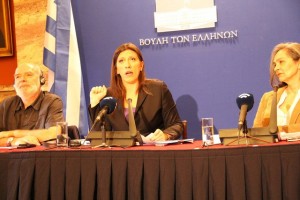 For the first time in Europe a committee for an audit of the debt (with citizens’ participation) was set up under the auspices of a parliament. On Saturday 4 April the president of the Greek parliament Zoe Konstantopoulou opened the first official session creating a debt audit committee , also called committee for the truth about the debt.
For the first time in Europe a committee for an audit of the debt (with citizens’ participation) was set up under the auspices of a parliament. On Saturday 4 April the president of the Greek parliament Zoe Konstantopoulou opened the first official session creating a debt audit committee , also called committee for the truth about the debt.
Zoe Konstantopoulou read the decree establishing the committee consisting of Greek and foreign members and defined its mission, namely to identify what part of the Greek debt is illegal, illegitimate, odious or unsustainable, in other words to establish the truth about the Greek debt. They will provide their findings to the Greek parliament, the European parliament, the parliaments of the EU member States as well as to the Greek and international public opinion. Zoe K. recalled the suffering imposed on the Greek people by the creditors’ demands. More detail here
Government submits draft legislation to start to tackle humanitarian crisis:electricity, housing, food 2.March 2015
The draft contains measures for free electricity, rent- and food allowances. But also free access to health and public transportation. In particular:
a) Free electricity for up to 300 KhW per household until the end of 2015 for 300,000 households. Free reconnection of power to primary residence cut off due to unpaid bills.
b) Rent-allowance of €70 – €220 per month for up to 30,000 households.
c) Food allowance for the supply of basic food and other items for 300,000 people via food stamps or electronic ‘smart card’.
Priority will be given to families with under-aged children, jobless and long-term unemployed, tenants under risk to be evicted and families who do not have access to these three basic goods: electricity, housing, food.
The draft law submitted by alternate Finance Minister Dimitrios Mardas and Alternate Minister of Social Solidarity Theano Fotiou will be debated in the Parliament.
The government has repeatedly reiterated that the humanitarian crisis legislation cannot be object of negotiations with the country’s creditors. It is part of SYRIZA’s pre-election promises. Draft legislation sources: newsit.gr, protothema, in.gr Read more here
Greek Finance Minister’s letter to the Eurogroup listing the measures to be taken – Feb 24th 2015: 
(Reuters) – Following is the text of Greek Finance Minister Yanis Varoufakis’s letter to Eurogroup President Jeroen Dijsselbloem outlining Greece’s proposed reforms.
Dear President of the Eurogroup,
In the Eurogroup of 20 February 2015 the Greek government was invited to present to the institutions, by Monday 23rd February 2015, a first comprehensive list of reform measures it is envisaging, to be further specified and agreed by the end of April 2015.
In addition to codifying its reform agenda, in accordance with PM Tsipras’ programmatic statement to Greece’s Parliament, the Greek government also committed to working in close agreement with European partners and institutions, as well as with the International Monetary Fund, and take actions that strengthen fiscal sustainability, guarantee financial stability and promote economic recovery.
The first comprehensive list of reform measures follows below, as envisaged by the Greek government. It is our intention to implement them while drawing upon available technical assistance and financing from the European Structural and Investment Funds. Continue reading here
‘We are going to destroy the Greek Oligarchy System’ Interview with Yannis Varoufakis.
 Yannis Varoufakis, now the new Finance Minister, speaks to Paul Mason Channel 4 News on the eve of the Elections about what a Syriza government will do and the threats it will face. Watch here
Yannis Varoufakis, now the new Finance Minister, speaks to Paul Mason Channel 4 News on the eve of the Elections about what a Syriza government will do and the threats it will face. Watch here
SIGN THE OPEN LETTER OF SOLIDARITY WITH THE ANTI-AUSTERITY MOVEMENT IN GREECE here
Get your organisation or union to discuss and pass this resolution. Let us know.
GREECE SOLIDARITY MODEL RESOLUTION Download Greece solidarity resolution
THE RESULTS OF THE GREEK ELECTIONS
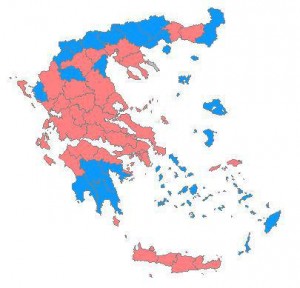 The victory of Syriza, the anti-austerity radical coalition, in the 25th January Elections caused huge outpourings of jubilation and relief on the streets of Athens. Syriza won 36.34% of the vote and 149 seats, just two seats short of an absolute majority. Syriza came first in 42 of the 56 electorates. Support for the traditional social democratic party PASOK collapsed to 4.7%, who paid heavily for their participation in the New Democracy-led government implementing the policies imposed on Greece by the Troika. Conservative, former ruling party New Democracy won the lowest number of seats ever winning 27.81% of the vote. The vote for Golden Dawn, extreme right party, fell to 6.28%. Full results here
The victory of Syriza, the anti-austerity radical coalition, in the 25th January Elections caused huge outpourings of jubilation and relief on the streets of Athens. Syriza won 36.34% of the vote and 149 seats, just two seats short of an absolute majority. Syriza came first in 42 of the 56 electorates. Support for the traditional social democratic party PASOK collapsed to 4.7%, who paid heavily for their participation in the New Democracy-led government implementing the policies imposed on Greece by the Troika. Conservative, former ruling party New Democracy won the lowest number of seats ever winning 27.81% of the vote. The vote for Golden Dawn, extreme right party, fell to 6.28%. Full results here
New Short film ‘GREECE THE END OF AUSTERITY? HOW SYRIZA CAME TO POWER ‘ by Theopi Skarlatos.
“Syriza had 22 days to make history. This is how they did it,” says director Theopi Skarlatos describing her latest documentary “Greece: The End of Austerity?”
“We followed Syriza’s activists, candidates and leadership from the waterfront, to remote mountain villages, to the nail biting final days.”
The director and her crew got access inside Alexis Tsipras’ campaign trail showing us how this young liberal created a wave of hope in Greece and eventually became the country’s Prime Minister. Now, it’s his time to fulfill the promises he made so the hope in Greece won’t die again.
Live Green Left Election Blog from the Greek Elections in Athens available here
Marina Prentoulis, Syriza, speaking at the Rally.
Stathis Kouvelakis, Syriza:‘Athens is now the capital of hope. The Syriza election victory is not the end point – it is the start of a new long battle ahead…To win the battle international mobilisation is indispensable. What has started in Athens now marks the end of a cycle which started 4 decades ago in Chile in 1973. As the tanks which invaded the streets of Santiago signalled the start of the neoliberal counterrevolution, Allende gave his last message to the Chilean people: “I am certain that the seed we have planted in the consciousness of thousands and thousands of Chileans will not be destroyed.” We can say, the time has come for the seed to flourish again. It will flourish in Athens, in Madrid, Jeremy Corbyn MP speaking at the Rallyin Dublin. The wind from the South will blow all across Europe. We will win!’
Jeremy Corbyn MP outlines Cameron’s response to Tsipras speaking at the Rally
TUC President Leslie Manasseh spoke on behalf of the TUC – read his speech here
Around 350 people packed the main Trade Union Congress Hall to hear speakers accounts and analysis of the Greek Elections and the position of the new Syriza government. Leading members of SYRIZA, Marina Prentoulis and Stathis Kouvelakis gave a first hand account of the campaign and of the results. Also speaking were Cherry Sewell and Kate Hudson from GSC and MPs Katy Clark and Jeremy Corbyn. The TUC President Leslie Manasseh spoke on behalf of the TUC.
Statement by the ETUC European Trade Union Council
Commenting on the elections and new Government in Greece, ETUC General Secretary Bernadette Ségol said, after a meeting of the ETUC Steering Committee with national trade unions leaders: “The situation in Greece represents an opportunity not only for Greece but for all Europe. It is an opportunity to re-evaluate the economic and social policies pursued since the crisis, and to take a new path.
“Austerity and structural reforms have not solved the problems facing Greece, and other countries. On the contrary they have added new problems, without solving the old ones. Citizens have been made to pay a very high price, but tax collection and corruption have not improved.”
“Only investment at the sort of level proposed by the ETUC – 2% of GDP over a decade – can create the growth and jobs that are so desperately needed in Greece and throughout Europe.”
“The new Greek Government must be given time to put in place new policies. It is vital for Europe’s democracy that the Greek people’s clearly expressed wish for an end to austerity is respected.”
Report and photos of Greece Solidarity Campaign Pre-Election Briefing Monday January 12th 2015 London on GSC Facebook here
Report and photos of GSC Stand with Greece – Vote for Change Solidarity Action 17 January 2015 Big Ben on GSC Facebook here
SIGN – THE GREEK AND EUROPEAN-WIDE APPEAL: Change Greece, Change Europe, Change4All
‘Throughout Europe, we will defend the right of the Greek people to make their decisions freely; to break with austerity; to pave the way for a real alternative for Greece – for a social and democratic re-orientation.’ Read and sign the Appeal
Greece Solidarity Campaign Statement on the Greek Elections.
STAND WITH THE PEOPLE OF GREECE!
 Greece stands on the brink of momentous change. The forthcoming general election presents huge, transformative opportunities to the people of Greece – and to Europe more widely. The anti-austerity party SYRIZA – and the movement and people as a whole – has a strong chance of victory.
Greece stands on the brink of momentous change. The forthcoming general election presents huge, transformative opportunities to the people of Greece – and to Europe more widely. The anti-austerity party SYRIZA – and the movement and people as a whole – has a strong chance of victory.
If this happens, a new government will be formed which will place the defence of the people at the heart of its programme.
This will be a government that will no longer let Greece be subjected to the rule of the Troika. It will be a Government that is transparent and democratic, a clear break from the corrupt elite who created the debt crisis for their own profit and then on behalf of the Troika forced on the Greek people the most extreme policies of austerity in Europe. Full GSC Statement here
TUC General Secretary Frances O’Grady issues Statement on the Greek Elections 20.1.2015
‘This Sunday, the Greek people go to the polls in what must be one of the most important elections not just for Greece but for Europe as a whole. What is at stake is the future of democratic control of the economy, and the European establishment’s love affair with austerity.’ more
JUBILEE DEBT CAMPAIGN REPORT: At least 90% of the Greek bailout has paid off reckless lenders 18.1.2015
 New analysis of IMF figures, released by the Jubilee Debt Campaign, show that almost all of the money lent by the IMF, European governments and the European Central Bank to Greece has been used to pay off reckless lenders, with less than 10% of it reaching the Greek people
New analysis of IMF figures, released by the Jubilee Debt Campaign, show that almost all of the money lent by the IMF, European governments and the European Central Bank to Greece has been used to pay off reckless lenders, with less than 10% of it reaching the Greek people
Greece needs debts cancelled and growth. Letter from 35 international economists. The Guardian 20.1.2015
 As economists, we note that the historical evidence demonstrates the futility and dangers of imposing unsustainable debt and repayment conditions on debtor countries; the negative impact of austerity policies on weakening economies; and the particularly severe effects that flow on to the poorest households.
As economists, we note that the historical evidence demonstrates the futility and dangers of imposing unsustainable debt and repayment conditions on debtor countries; the negative impact of austerity policies on weakening economies; and the particularly severe effects that flow on to the poorest households.
We therefore urge the troika (EU, European Centra Bank and IMF) to negotiate in good faith with the Greek government so that there is a cancellation of a large part of the debt and new terms of payment which support the rebuilding of a sustainable economy. …
We urge the Greek government to abandon the austerity programme that is crushing economic activity and adopt a more expansive fiscal policy setting, targeting immediate relief from poverty and stimulating further domestic demand…. Full letter and signatories here
A new idea steals across Europe – should Greece’s debt be forgiven?
‘As anti-austerity Syriza rises in the polls, threatening a crisis, experts are starting to believe default might be best for everyone.’ wrote Heather Stewart in the Observer 18.1.2015
Interview with Alexis Tsipras, leader of Syriza, by Paul Mason Channel 4 
‘If Syriza becomes the first far left government in modern Europe, its MPs will be asked to pull the trigger on a showdown with Europe that could change the economics of the whole Eurozone… Tsipras has pledged to end the austerity programme imposed by the troika – and at the same time negotiate the write-off of 50 per cent of Greek debt ..’ Paul Mason’s Blog and TV interview here
Keynote Speech by Alexis Tsipras to Syriza Congress, January 3rd 2015 
‘The future has already begun….’
‘We commit ourselves anew to our non-negotiable program. Putting an end to the social tragedy, the nightmare of austerity and authoritarianism.
Putting an end to barbarism. But also putting the knife deep into the heart of corruption, of petty machinations and offensive injustice…’
View subtitled extracts here
Full speech here, translated by the Australian Greece Solidarity Campaign
Greece cannot Pay. Write off the Debt. Call for a European Debt Conference
Interview with economist Costas Lapavitsas, adviser to Syriza, on BBC Hard Talk. (8.1.15)
Analyze This –News and Left Politics
Analysis in English on this new Greek website.
Sto Kokkino (Red Radio) Greek news in English 
Call from Solidarity for All, Greece, January 1st 2015 
We start from Greece – We change Europe
Create an international solidarity campaign of hope against fear! The forthcoming elections in Greece promise a hopeful New Year start. The ‘panic’ over the weakest link named Greece haunts once more the European (and not only European) elites. Even more so, as the possibility for a break with the Troika regime and austerity in Greece seems more viable than ever.
As soon as the collapse of the pro-Troika (conservatives and social-democrats) coalition government happened a few weeks ago, the threats and blackmail against the Greek people started up again. The reassurance that the EU (and global) markets are protected from the effects of a change in Greece, do not suffice to ease the political threat such a change signals for the dominant status quo. The rhetoric of “a success story” and “GRecovery” were immediately replaced by direct interventions and “alarming” statements. Financial and political officials re-launched the scenario of a “GRexit” and of a possible (Troika-driven) bank-run, as well as suggestions to the Greek electorate to act within the framework of the bailout policies (W. Schäuble) by preferring (voting for) the familiar faces of the pro-Troika parties (P. Moscovici). Fear is changing sides but the conflict is expected to be long and fierce.
In the context of the crisis, Greece has been used as the testing ground for the deepening of the neoliberal restructuring and austerity regime throughout Europe. But Greece has also emerged as a paradigm of resistance. The multiform and protracted struggles of its people both obstructed the implementation of such policies and gave life to new forms of grass-root organizations, solidarity and social participation. These efforts were met with the generous mobilization of movements around the world that have shown their persistent solidarity. This enabled the Greek society to stand up with dignity against the social catastrophe that brought it to the point of humanitarian crisis, and to emerge as a lethal threat to the Troika regime, sending a message all over Europe. Those responsible for the current situation know it only too well, and do their best, in unison, to protect their interests by holding on to power by any means.
By the same token, the elections of the 25th January will not just decide the future Greek government, neither can they be fought in Greece alone. An anti-Troika, anti-austerity victory in Greece opens up the potential for an overturn of the neoliberal domination in EU, and beyond. Thus the current elections consist a fight of all the European people, of all the movements that resist and oppose any aspect of a neoliberal, anti-social and undemocratic Europe.
Therefore we call for a mass political campaign in support of a change in Greece. A multiform campaign that informs the public opinion in each country about the real situation that bailouts and austerity have created in Greece, and about what actually is at stakes in the forthcoming elections for the entire continent. A campaign that counters the dominant misinformation and spread of fear, a campaign that pressurizes all those responsible for the appalling situation in Greece and throughout Europe.
A campaign that sends a message of hope and change, against the paralyzing rhetoric of fear and poverty.
Let’s make the overthrow of austerity and Troika in Greece more than a wish for 2015.
Let’s make this next year, a year of change in Europe starting from Greece.
Irish MPs support Syriza 20.1.2015 
STATEMENT IN SUPPORT OF SYRIZA FROM IRISH TDs (=MPs)
Victory to Syriza – End austerity – for a Europe of solidarity and co-operation which puts the interests of its people before that of banks, bond holders and big business.
We the undersigned are elected Deputies to the Irish parliament. We wish to convey our solidarity and hopes for a victory for Syriza in the elections now underway in Greece. We welcome your commitment to end austerity and to take measures to combat the human crisis which austerity has caused in Greece.
We welcome the initiative which Syriza has raised of an EU debt conference along the lines of the London 1952/3 conference which cut Germany’s debt by 50% and introduced a long term easy payment plan for the balance. This played a role in the economic recovery not just in Germany but across Europe following the devastation of the war.
It is inevitable that the EU political and business elite will oppose these measures. We believe this opposition has to be met with mass mobilisations not just in Greece but across the EU. We will be working to raise awareness of these issues and to campaign for support among working people in Ireland.
In the autumn of 2014 there has been a massive ‘people power’ movement in Ireland. This has been against a plan to charge for domestic water, which has traditionally been paid for by general taxation. This was seen correctly, not just as another austerity measure, but a move to ‘commodify’ water as a step to future privatisation.
This movement involved the biggest street mobilisations in over 30 years, spontaneous action in working class areas to physically block the installation of water meters, and now community campaign groups are organising for mass non payment of the charges.
This movement also reflects the built up anger over 6 years of austerity and the bailing out of banks and bond holders at the expense of working people and in particular the most vulnerable groups in society.
The government have been forced into a series of concessions but the people now feel their power and are determined to continue the struggle . These events have had a huge political effect in working class communities. There is a discussion now about how to broaden out the movement and how to build a working class movement to challenge on the political front.
We hope a victory for Syriza will raise the aspirations of all working people and assist us in playing our part in building a radical left which can win political power in Ireland.
In solidarity,Joan Collins TD. Clare Daly TD. Thomas Pringle TD. Maureen O’Sullivan TD. Mick Wallace TD. John Halligan TD.Seamus Healy TD. Richard Boyd Barrett TD (PBPA). Joe Higgins TD (AAA). Paul |Murphy TD (AAA). Ruth Coppinger TD (AAA).
Let Greece Breathe – Statement signed by Economists 20.1.2015 (Australia Greece Solidarity Campaign)
Forty Australian economists have issued a statement prior to the Greek national elections on January 25 to condemn the debt recovery program as unsustainable. Economists condemn unsustainable debt and austerity programs in lead up to Greek elections. The wide ranging list includes nine professors of economics, among them Professor John Hewson from the Australian National University (former federal leader of the Australian Liberal Party).
The economists have also criticised the austerity program imposed on Greece as a failure and are calling for a more sustainable economic pathway. They have called on any future Greek government to get serious in dealing with public financial management problems including the issue of corruption. “Even though it is widely understood among economists that the Greek austerity program has been a disaster, the Troika is continuing to impose demands which make the Greek economy ever weaker, crushing the livelihoods of most of its people,” said Dr. George Argyrous of the University of New South Wales.. “Now the Greek people finally have a chance to speak for themselves about the austerity program it is vital that their democratic voice is respected and that Europe and the global community enter into a new, more respectful relationship with the Greek people,” said Dr. Argyrous . Emeritus Professor Frank Stilwell of the University of Sydney said, “We believe that after the January 25 elections there must be a rapid change of direction so that unpayable Greek public debt is cancelled and a policy for restoration of living standards, social rights and economic growth is strongly supported”.
The statement is an initiative of the Australia – Greece Solidarity Campaign and titled “Let Greece Breathe”. The Campaign Coordinator, Mr Adam Rorris, said the aim was to demonstrate the strong Australian support for the Greek people in their current crisis. “Australia must use its voice in the IMF and through other diplomatic means to make it clear that it does not support the imposition of sovereign debt programs which are unviable in terms of recovery and lead to great hardship for ordinary people on the street”, said Mr Rorris. “We want the Australian government to respect the democratic voice of the Greek people, provide direct support in any difficult circumstances following the January 25 election and to urge other governments in the international community to help resolve the European debt crisis,” said Mr Rorris.
The Let Greece Breathe -Statement of Endorsement by economists and complete list of economists who have offered their endorsement are below.
‘We, the undersigned economists: Note:
• the historical evidence demonstrating the futility and dangers of imposing unsustainable debt and repayment conditions on debtor countries, and
• the negative impact of austerity policies on weakening economies and the particularly severe effects that flow on to the poorest households
Call upon the Troika (EU, ECB and IMF) to negotiate in good faith with the Greek government so that:
• there is a cancellation of a large part of the debt, and
• there are new terms of payment that support the rebuilding of a sustainable economy.
• this settlement commences a new EU wide policy framework favouring pro-growth rather than deflationary policies
Call upon the Greek government to:
• abandon the austerity program that is crushing economic activity and adopt a more expansive fiscal policy setting, targeting immediate relief from poverty and stimulating further domestic demand,
• launch a fully independent investigation into the historic and systemic failure of the Greek public financial management processes (including any evidence of corruption) that led to the accumulation of debt, the disguising of the size and nature of the debt and the inefficient/ineffective use of public funds, and
• consider the establishment of a judicial body or alternative mechanism that is independent of government and charged with a future responsibility of investigating corruption from the highest to lowest levels of government.
Call upon other national governments to exercise their vote within official sector finance agencies and pursue other diplomatic activities that will support:
• a cancellation of a large part of the Greek sovereign debt, and
• new terms of payment for the rebuilding of a sustainable Greek national economy
List of Economists Endorsing Statement (First Name Surname Affiliation) George Argyrous UNSW Professor Tony Aspromorgous Sydney University Mike Beggs Sydney University Grant Belchamber ACTU Dick Bryan Sydney University Gavan Butler Sydney University Damien Cahill Sydney University Lynne Chester Sydney University Roni Demirbag Sydney University Richard Denniss Australia Institute Professor Robert Dixon Melbourne University Alan Duhs University of Queensland Bradon Ellem Sydney University Tim Harcourt UNSW Professor Geoff Harcourt UNSW Neil Hart UNSW Professor John Hewson ANU Evan Jones Sydney University Professor John King La Trobe University Peter Kreisler UNSW Rick Kuhn ANU James R. Levy UNSW John Lodewijks UNSW Bill Lucarelli, University Western Sydney Johnson Michael UNSW Alan Morris University of Technology Sydney Professor Adam Morton Sydney University Professor John Quiggin University of Queensland Patricia Ranald Sydney University Adam Rorris Centre for Policy Development Stuart Rosewarne Sydney University Susan Schroeder Sydney University Chris Sheil UNSW Tom Skladzien AMWU Ben Spies-Butcher Macquarie University John Spoehr University of Adelaide Professor Frank Stilwell Sydney University Tim Thornton La Trobe University GRAHAM WHITE Sydney University Professor John Wiseman University of Melbourne
Statement by Australian Trade Union Leaders (Australian Greece Solidarity Campaign)
We, the undersigned Australian Trade Union Leaders express our solidarity with the Greek people and in particular the workers of Greece and their unions who have endured and continue to suffer the consequences of an unfair and disastrous economic regime devised by external economic and political forces and imposed on them by a Troika – subservient Government.
Specifically we note:
- the negative impact of austerity policies on weakened economies and the particularly severe effects that flow on to the poorest households, workers and the rapidly growing army of the young unemployed, and
- the clear evidence demonstrating the futility and dangers of imposing unsustainable debt and repayment conditions on debtor countries.
Accordingly – We Call upon the Troika (EU, ECB and IMF) to negotiate in good faith with the Greek government so that:
- there is a cancellation of a large part of the debt, and
- there are new terms of payment that support the rebuilding of a sustainable economy.
- this settlement commences a new EU wide policy framework favouring pro-growth rather than deflationary policies.
- Clauses are removed from official sector agreements that threaten workers rights such as collective bargaining and minimum wage protections and that lead to the privatisation of public services and assets.
We Call upon the Greek government to:
- abandon the austerity program that is crushing economic activity and adopt a more expansive fiscal policy setting, targeting immediate relief from poverty and stimulating further domestic demand and employment growth.
- Prioritise improving the minimum wage to support working families
- Re-establish the right to enter collective bargaining so the regulations are consistent with the provisions of the International Labour Organization (ILO)
- Repeal of regulations making it easy for firms to engage in tactical mass layoffs of workers
Call upon other national governments to exercise their vote within official sector finance agencies and pursue other diplomatic activities that will support:
- a cancellation of a large part of the Greek sovereign debt, and
- new terms of payment for the rebuilding of a sustainable Greek national economy
s are removed from official sector agreements that threaten workers rights such as collective bargaining and minimum wage protections and that lead to the privatisation of public services and assets.
We Call upon the Greek government to:
- abandon the austerity program that is crushing economic activity and adopt a more expansive fiscal policy setting, targeting immediate relief from poverty and stimulating further domestic demand and employment growth.
- Prioritise improving the minimum wage to support working families
- Re-establish the right to enter collective bargaining so the regulations are consistent with the provisions of the International Labour Organization (ILO)
- Repeal of regulations making it easy for firms to engage in tactical mass layoffs of workers
Call upon other national governments to exercise their vote within official sector finance agencies and pursue other diplomatic activities that will support:
- a cancellation of a large part of the Greek sovereign debt, and
- new terms of payment for the rebuilding of a sustainable Greek national economy


